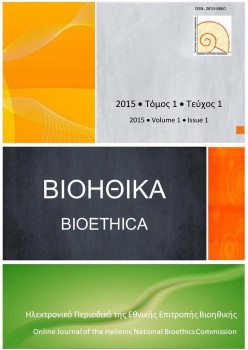Defining health and disease: Self-knowledge as a standard of health
Abstract
A central issue in the philosophy of medicine is to solve the problem of determining the nature of the concepts of health and disease. Some theorists claim that health and disease are purely value-free and descriptive concepts that are discoverable and grounded in the biological and medical sciences. Others claim that health and disease are essentially value-laden concepts, i.e. healthy states are those states we (individuals, groups, societies) desire or value and diseased states are those we want to avoid or disvalue.
Considering the longtime disagreement among physicians, theorists of health and philosophers about the essential characteristics of health and disease, the aim in the first part of this paper is to briefly present four different philosophical approaches of health and disease in an attempt to introduce the readers to the debate. This article begins with the Biostatistical theory of Christopher Boorse. It turns to the Malady theory of Danner Clouser, Charles Culver and Bernard Gert, the holistic theory of Lennart Nordenfelt and finally the adaptation theory of József Kovács.
In the second part of the paper, some objections will be stated to each theory. In the third and last part, a completely different account of health will be given, which holds that self-knowledge is a criterion of human health. Health, unlike disease, is not a state or a condition of the organism but an endless process. Its essence can be better captured in philosophical rather than medical terms and it should be applied only to human beings.
Article Details
- How to Cite
-
Αθανασιάδης (Grigoris Athanasiadis) Γ. (2015). Defining health and disease: Self-knowledge as a standard of health. Bioethica, 1(1), 4–24. https://doi.org/10.12681/bioeth.19784
- Section
- Original Articles
Authors who publish with this journal agree to the following terms:
- Authors retain copyright and grant the journal right of first publication with the work simultaneously licensed under a Creative Commons Attribution CC BY 4.0 License, which allows for immediate free access to the work and permits any user to read, download, copy, distribute, print, search, or link to the full texts of articles, crawl them for indexing, pass them as data to software, or use them for any other lawful purpose. Appropriate credit must be given by citing the author(s) and the original publication in this journal.
- Authors are able to enter into separate, additional contractual arrangements for the non-exclusive distribution of the journal's published version of the work (e.g. post it to an institutional repository or publish it in a book), with an acknowledgement of its initial publication in this journal.
We encourage authors to deposit their articles, as well as data underlying the publications, in institutional and/or other appropriate subject repositories.
Bioethica permits and encourages authors to archive the final publication pdf in institutional (e.g. the repository of the National Hellenic Research Foundation) or other appropriate subject repositories (e.g. SSOAR repository for social sciences), in compliance with institutional and/or funder open access policies, after publication in the BIOETHICA. Authors must provide bibliographic details that credit publication in the journal, as well as related funding details (when applicable).
Lists of institutional and other subject-based academic open access repositories can be found listed by country at the registry http://opendoar.org/countrylist.php
If your institution does not possess a repository you may deposit a copy of your paper at no cost with www.zenodo.org , the repository supported for open access research in the EU by the European Commission, through the project OpenAIRE (www.openaire.eu )



